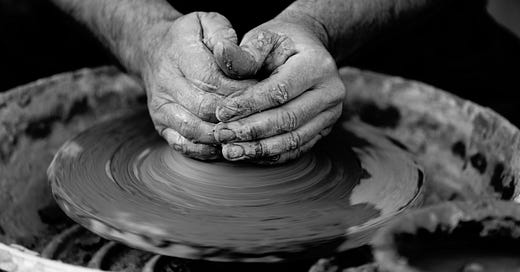“I circle around God, around the primordial tower. I’ve been circling for thousands of years and I still don’t know: am I a falcon, a storm, or a great song?” From “I live my life in widening circles” —Rainer Maria Rilke
Dear friends,
For those of you who are new here, welcome! I am glad you found this space to cultivate your creativity and creative imagination. I am so excited to share a range of topics tied to creativity in the upcoming months, but one idea that I always love to circle back to is “calling.”
What is a calling, you might ask? A vocation? A job? Our holy tasks?
There are lots of books out there on a theology of vocation and calling, and I find a lot of them to be somewhat frustrating. I think what they all acknowledge, however, is that the language around vocation and callings needs to be richer. Yes! What is the relationship, after all, between my vocation (wife and mother) and my creative work that I am called to do?
I found Edward Hahnenberg’s “Awakening Vocation: A Theology of Christian Call” to be helpful here. He says that the idea of call is “a constructive alternative to our contemporary cultural default, namely, choice.” What we need is the language to express our callings as pilgrims searching for and navigating our way toward God. Here he finds the language of vocation to help in understanding callings:
It taps into the deep-seated sensibilities of the quest—integrity, identity, itinerary—but in a way that resists self-absorption. It acknowledges the importance of discernment and decision—the virtues of choice—but recognizes that our decisions come as a response to something or someone beyond. To speak of call is to acknowledge a caller, to see that God’s gracious initiative precedes all of our projects and our plans, that our individual journeys have a goal.
Vocations often till the soil of our callings. I think of the father-musician who practices and shares his music with his family, building a life that sparks his children to pursue the arts. And sometimes our creativity isn’t always artistic in the traditional sense. I’m thinking of the mother-friend—the mother who uses her gifts of bringing people together to help foster meaningful relationships between others.
Our vocations are generous in that way. They give us a wellspring of beauty to either receive or ignore. Our callings should serve our vocations in some good way, and our vocations often open the door to those callings.
I’ve also found the idea of calling explored in careful ways in literature and poetry, which often resonate more than what theology alone can offer. Here are a few writers I love, asking the question of calling in clever and innovative ways:
1. Mary Oliver’s emboldening question in the last couplet of “The Summer Day”: “Tell me, what is it you plan to do / with your one wild and precious life?”
2. Annie Dillard’s essay “Living Like Weasels”: “The thing is to stalk your calling in a certain skilled and supple way, to locate the most tender and live spot and plug into that pulse. This is yielding, not fighting. . . . I think it would be well, and proper, and obedient, and pure, to grasp your one necessity and not let it go . . .”
3. Rainer Maria Rilke’s ability to notice how our callings are yoked to our relationship to God in his poem “I live my life in widening circles.”
I would love to hear: How did you find your callings, or did your callings pursue you?
Thanks for subscribing to A Holy Wonder. If you’ve enjoyed the newsletter, I invite you to share it with others.






Although I have always felt “called” towards marriage and motherhood as a vocation, I did not fully embrace it until I head the Apostolate of Holy Motherhood. It completely flipped my personal view of my role on its head. So, in a way, I pursued my calling, but the depth of it came when it pursued me.